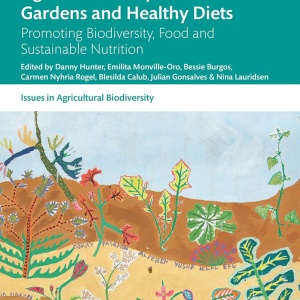
This book examines the role of school gardens in addressing malnutrition among students and promoting healthy eating. It includes case studies in Nepal and the Philippines.
Publisher’s summary
This book critically assesses the role of agrobiodiversity in school gardens and its contribution to diversifying diets, promoting healthy eating habits and improving nutrition among schoolchildren as well as other benefits relating to climate change adaptation, ecoliteracy and greening school spaces.
Many schoolchildren suffer from various forms of malnutrition and it is important to address their nutritional status given the effects it has on their health, cognition, and subsequently their educational achievement. Schools are recognised as excellent platforms for promoting lifelong healthy eating and improving long-term, sustainable nutrition security required for optimum educational outcomes. This book reveals the multiple benefits of school gardens for improving nutrition and education for children and their families. It examines issues such as school feeding, community food production, school gardening, nutritional education and the promotion of agrobiodiversity, and draws on international case studies, from both developed and developing nations, to provide a comprehensive global assessment.
This book will be essential reading for those interested in promoting agrobiodiversity, sustainable nutrition and healthy eating habits in schools and public institutions more generally. It identifies recurring and emerging issues, establishes best practices, identifies key criteria for success and advises on strategies for scaling up and scaling out elements to improve the uptake of school gardens.
Reference
Hunter, D., Monville-Oro, E., Burgos, B., Roel, C. N., Calub, B. M., Gonsalves, J. and Lauridsen, N. (eds.) (2020). Agrobiodiversity, School Gardens and Healthy Diets: Promoting Biodiversity, Food and Sustainable Nutrition. Routledge, London and New York.
Read more here. See also the Foodsource building block What is malnutrition?







Post a new comment »